|
|
|
Sort Order |
|
|
|
Items / Page
|
|
|
|
|
|
|
| Srl | Item |
| 1 |
ID:
128869
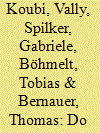

|
|
|
|
|
| Publication |
2014.
|
| Summary/Abstract |
This article reviews the existing theoretical arguments and empirical findings linking renewable and non-renewable natural resources to the onset, intensity, and duration of intrastate as well as interstate armed conflict. Renewable resources are supposedly connected to conflict via scarcity, while non-renewable resources are hypothesized to lead to conflict via resource abundance. Based upon our analysis of these two streams in the literature, it turns out that the empirical support for the resource scarcity argument is rather weak. However, the authors obtain some evidence that resource abundance is likely to be associated with conflict. The article concludes that further research should generate improved data on low-intensity forms of conflict as well as resource scarcity and abundance at subnational and international levels, and use more homogenous empirical designs to analyze these data. Such analyses should pay particular attention to interactive effects and endogeneity issues in the resource-conflict relationship.
|
|
|
|
|
|
|
|
|
|
|
|
|
|
|
|
| 2 |
ID:
128854
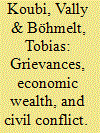

|
|
|
|
|
| Publication |
2014.
|
| Summary/Abstract |
One of the most robust findings in the literature on civil conflicts is that high income levels are associated with a lower risk of conflict onset. This article addresses the wealth-conflict link and discusses it in relation to the dominating `greed vs. grievance' dichotomy. It is further argued that the effect on conflict of grievances, in the form of horizontal inequalities, is conditioned on national wealth. More specifically, there may be a higher risk of civil war in those countries that have much wealth, but where a large share of the population is potentially excluded from accessing it. The empirical analyses testing this argument employ time-series cross-section data for 1951-2004 and find support for the theory. The authors also show that taking this conditional relationship into account improves our ability to predict the onset of civil conflict.
|
|
|
|
|
|
|
|
|
|
|
|
|
|
|
|
| 3 |
ID:
188075
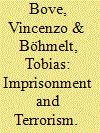

|
|
|
|
|
| Summary/Abstract |
While policymakers frequently praise the impact of law enforcement for addressing the threat of terrorism, several cases suggest that the imprisonment of terrorists and potential perpetrators may actually lead to (more) radicalization and, ultimately, a higher risk of terrorism. We take systematic stock of the arguments linking terrorism with incarceration and analyze newly collected data on worldwide prison populations. The results from quantitative analysis highlight that an increase in prison population is correlated with a decline in the number of terrorist attacks, in particular its domestic form. We conclude with a discussion of the implications of this finding for academic and policy circles.
|
|
|
|
|
|
|
|
|
|
|
|
|
|
|
|
| 4 |
ID:
164673


|
|
|
|
|
| Summary/Abstract |
Political leaders are ultimately responsible for their country's foreign policy, but our understanding of how executive turnover affects the likelihood of international treaty ratification remains limited. For contributing to this debate, I define leader change as the replacement of the executive leader by a new one who relies on different social groups for support. Focusing then on those cases where new leaders can assume office only from predecessors who plausibly supported treaty ratification, I expect that—in light of the predecessor's support for an agreement and the change in the domestic support base—leadership turnover makes ratification less likely. The empirical implication is tested with quantitative methods using data on multilateral treaties of the post–Cold War era. The main findings and a series of additional analyses provide strong and robust evidence for the theoretical argument. This research sheds new light on the determinants of multilateral cooperation as well as the role of government leaders in international affairs and foreign-policy decision-making.
|
|
|
|
|
|
|
|
|
|
|
|
|
|
|
|
| 5 |
ID:
156243
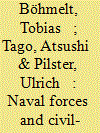

|
|
|
|
|
| Summary/Abstract |
While the importance of navies for international affairs is widely documented, their influence in domestic politics remains less understood. This research offers a comparative account of how states’ naval forces affect civil-military relations. Does the navy matter for military attempts to seize government power? Urban populations, especially middle class elements in the capital city, are more capable (if willing) of creating opportunities for the armed forces to overthrow the government. Recruitment practices and the location of bases often link naval forces more strongly to these societal elements. Thus, countries with a larger navy in relation to the army could be more vulnerable to a coup d’état. The empirical findings, based on the analysis of time-series cross-section data on a sample of all states between 1970 and 2007, provide strong support for this proposition. Several robustness checks further increase our confidence in the results.
|
|
|
|
|
|
|
|
|
|
|
|
|
|
|
|
| 6 |
ID:
147248
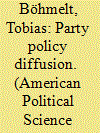

|
|
|
|
|
| Summary/Abstract |
Do parties learn from or emulate parties in other political systems? This research develops the argument that parties are more likely to employ the heuristic of learning from and emulating foreign successful (incumbent) parties. Spatial-econometric analyses of parties’ election policies from several established democracies robustly confirm that political parties respond to left-right policy positions of foreign political parties that have recently governed. By showing that parties respond to these foreign incumbent parties, this work has significant implications for our understanding of party competition. Furthermore, we contribute to the literature on public policy diffusion, as we suggest that political parties are important vehicles through which public policies diffuse.
|
|
|
|
|
|
|
|
|
|
|
|
|
|
|
|
| 7 |
ID:
165881


|
|
|
|
|
| Summary/Abstract |
Military academies tend to be strongly linked to the professionalization of the armed forces. This explains why many countries in the world have created such institutions. The following article studies a potential negative externality stemming from military schools: increased coup risk. We argue that military academies may create, inculcate, and strengthen cohesive views that could conflict with incumbent policies, and that these schools establish networks among military officers that may facilitate coordination necessary for plotting a putsch. We also contend and empirically demonstrate that these negative side effects of military academies are in particular pronounced in nondemocracies, that is, military academies have diverse effects across regime types. This work has significant implications for our understanding civil–military relations. Furthermore, we contribute to the literature on military education and professionalization, as we suggest that military academies are important vehicles through which coups can emerge predominantly in authoritarian states.
|
|
|
|
|
|
|
|
|
|
|
|
|
|
|
|
| 8 |
ID:
145725
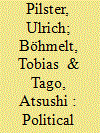

|
|
|
|
|
| Summary/Abstract |
Several studies have claimed that changes in the political leadership of a country affect foreign policy decision making. The following paper systematically tests this in the context of states' participation in military coalition operations. By building on previous theoretical models, the authors argue that new leaders may differ from their predecessors in that the former (i) have dissimilar preferences with regard to the involvement in military interventions, (ii) evaluate relevant information differently, and (iii) are less likely to be entrapped in intervention policies. Ultimately, the net effect of these factors should make it more likely that political leadership turnovers are associated with premature withdrawals from ongoing military coalitions. The theory is tested by quantitative analyses of newly collected data on military coalition operations in 1946–2001 and a qualitative case study. The authors find strong and robust support for their argument.
|
|
|
|
|
|
|
|
|
|
|
|
|
|
|
|
| 9 |
ID:
177839


|
|
|
|
|
| Summary/Abstract |
How does conscription influence citizens’ support for the armed forces? We argue that conscription, more so than voluntary-recruitment systems, can reach out to and socialize larger segments of the society in line with the military’s values. This, in turn, induces more positive views of the armed forces. Using a unique data set comprising information for 34 European states in 1997–2017, we find robust evidence that countries with conscription-based recruitment tend to be characterized by higher levels of support for the military. This result greatly adds to the debate about the type of military-recruitment system countries should implement: abolishing compulsory military service is usually seen as increasing efficiency and performance; yet, a positive – and previously unknown – externality of conscription that we identify is a higher degree of support by the public, which is pivotal for, inter alia, defense-policy implementation, military interventions abroad, budget considerations, or the participation in military alliances.
|
|
|
|
|
|
|
|
|
|
|
|
|
|
|
|
|
|
|
|
|